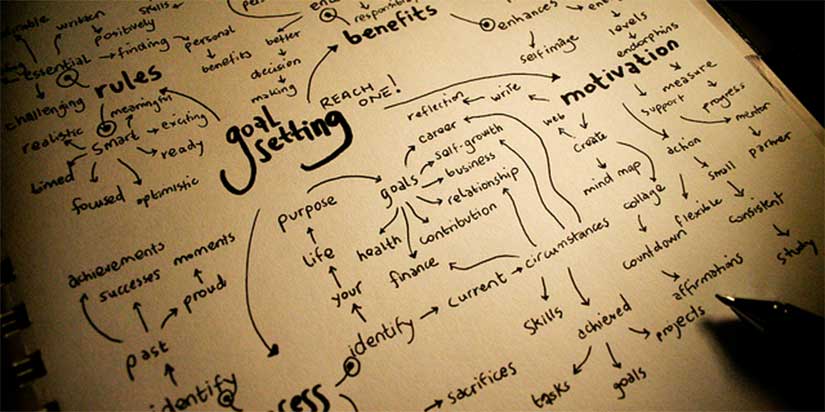Living Without Goals or New Years Resolutions
Until recently I had made goal setting a major function of my life. I would create a system of goals every six months and build my schedule around accomplishing my goals. But, recently I’ve began to see goal setting as unhealthy physically, mentally and emotionally. As such, I’m beginning to rethink the importance of goal setting and building my life around goals (and new year’s resolutions).
Why Goals Can Be Unhealthy
Please note that I’m not saying all goals are unhealthy. Mostly what I’ve come to believe is goals are based on a flawed and unhealthy lifestyle which will often produce more suffering than happiness.
Living in the Present: For those trying to live in the present moment (which is a major precept in Buddhism), goal setting is future based and not based in full enjoyment of the present moment. Living in the current moment involves a great deal of focus through active mindfulness. Being mindful means being fully aware of the current moment and activities you are engaged in.
New Year’s Resolutions: One of the most common New Year’s resolutions is “I will lose weight (or body fat) this year” or some variation like, “I’ll go to the gym three times a week this year.” The premise is last year you did not do exercise based activities so therefore the upcoming year you will make a goal to do exercise as a healthy activity. The flaw, I believe, with this approach is often the exercise goal is based upon what society says you should do, or on some personal flaw you feel you have, and a solution to address said flaw. Many would say this is “fear” based thinking or “herd” mentality and not based on what you truly would want or wish for if pressures of society were not present.
Suffering When Failing to Attain Goals: How many people actual attain their goals? What are the actual statistics on goal setting and attaining goals? Several books and studies are devoted to exactly this topic. Many will argue that even if you don’t attain 100% of the goal, that effort made toward the goal is a success. Perhaps this is true, that any progress toward goals is progress made that might not have been achieved without the goal. This logic should also be balanced by the emotional effect on the individual not achieving the goal. Does the person feel emotionally that they are a failure? Do they feel unhappy they didn’t achieve 100% of their goal? Are they truly content with partial progress toward a goal?
Passion Based Lifestyle Habits
If you live without goals, is there an alternative which allows individuals to achieve new physical, mental and spiritual plateaus while avoiding common suffering and unhappiness associated with failure of meeting goals? Until recently I could not really see any substantial alternatives to a goal-setting lifestyle. However, after reading an article by Leo Babauta, I believe there is another way: Passion Based Habits.
What Are Your Passions in Life? This is a great question. If you are not passionate about exercise, my guess is you’ll be miserable in the gym and only keep after it for a short time. Or, at best, if you do keep going to the gym daily or weekly, it won’t be a pleasant experience. However, in contrast, if you make a list of healthy activities you are passionate about, you might discover something you’ll be far more successful at. For instance, maybe after thinking on it, you are passionate about hiking and camping. Instead of making a goal to go the gym, you could incorporate physical activity into the camping and hiking activities. You could plan a Saturday morning hike to scout out an area for a future campout with friends or family. Then, in a following week, return with friends and family to the location. If camping and hiking are something you are truly passionate about, it can become a rewarding activity which fuels your engagement in an active lifestyle and pursuing activities which bring you a tremendous amount of pleasure and happiness.
Passion Based Living: Instead of thinking of goals for yourself, you might consider making a list of healthy activities you are passionate about. Each day, instead of making a list of goals, make a list of tasks focused on areas you are passionate about. Maybe you are really interested in learning about baking bread. Wouldn’t it be amazing instead of making a goal to become a master baker, to replace the goal with passions. Each day you could make a todo list based around one passion or a select few. Keeping the todo list short and simple helps assure success and reduces stress and becoming overwhelmed by a large list. Because you are choosing items which are related to your passions, the todo list should be much more enjoyable and easier to engage in (unlike a goal to run five miles on a treadmill when your normal lifestyle does not involve a treadmill).
Conclusion
Recently I’ve become convinced that goal setting sets us up for a high percent of statistical failure. Most goals tend to be more like wish lists rather than attainable realities. Replacing goals with todo lists focused on passionate areas of interest can bring a higher degree of success, allow for more present-moment based focus and greater daily happiness in our lives.




1 comment